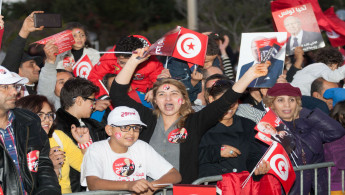Nidaa Tounes split threatens future of Tunisia's ruling party
The future of Tunisia's ruling party, Nidaa Tounes, is on the line with analysts saying a split is likely as a result of crisis over organising the party's general conference.
A group of 30 Nidaa Tounes MPs threatened on Wednesday to quit the party and start a new parliamentary bloc if the party's executive office, which they believe is the sole legitimate body authorised to organise the conference, does not convene by 10 November.
Hafedh Essebsi, the party's management director and son of President Caid Essebsi, along with a number of Nidaa Tounes officials, stand on the other side of the rift, arguing that the party's constituent committee is the body responsible for organising the conference.
| The conference crisis has turned into a power struggle between Mohsen Marzouk and Hafedh Essebsi |
The ongoing crisis between Essebsi and party general-secretary Mohsen Marzouk took a turn for the worse on Sunday when supporters of each bloc violently clashed in the coastal resort town of Hammamet, where a party meeting was scheduled to take place.
The conference crisis has turned into a power struggle between Marzouk and Essebsi, resulting in vocal attacks upon Tunisian President Beji Caid Essebsi, who has been accused of attempting to pass the party leadership on to his son, Hafedh.
Ridha Belhaj, the president's chief cabinet secretary, has also been accused of overseeing the party's battle from the presidential palace.
As such, a number of Nidaa Tounes MPs have called on the president to stop "interfering" in the affairs of the party and its parliamentary bloc in accordance with the country's constitution, which forbids the president from involvement in party affairs while in office.
Meanwhile, supporters of the president say the accusations are a personal attack, which they claim serves "hidden agendas" - especially at this sensitive time in Tunisia's political history.
'Suspicious' US visit
Abdelaziz Kotti, a pro-Essebsi MP, accused Mohsen Marzouk of "bearing his teeth since his return from the United Sates", in reference to the faction leader's recent four-day trip to Washington at the end of October.
According to reports, Marzouk met with top US officials in the State Department, National Security Council and the congressional committee on foreign affairs, raising suspicions of secretive deals.
"President Essebsi was very annoyed with this visit and its content and he expressed his annoyance at a meeting with MPs two days ago," said Khaled Chouket, a prominent Nidaa Tounes MP.
"Essebsi said that this behaviour was unacceptable, especially since Marzouk encouraged the Americans to withdraw their guarantee of a $500 million World Bank loan to Tunisia, and Essebsi said that Marzouk has crossed the red lines and harmed Tunisian interests," claimed Chouket.
Chouket also accused Marzouk of attempting to fulfill his "wild ambitions" and belittled MPs who threatened to quit the party: "Even if they create a new bloc, it will not change a thing."
However, Marzouk responded to the allegations, saying his US visit was conducted with the knowledge and participation of the Tunisian ambassador in Washington, adding that he had gone to deliver lectures defending the Tunisian democratic experience.
| Many political observers in Tunisia fear the current crisis could alter the political balance and destabilise the government |
Mohsen Marzouk - who managed Beji Caid Essebsi's presidential campaign and worked as his personal adviser - is known to have visited Washington on multiple occasions, which is why some fear that he might influence US officials to renege on their promise to guarantee Tunisia's $500 million loan from the World Bank.
Political instability
Many political observers in Tunisia fear the latest crisis could alter the political balance and destabilise the government - while officials attempted to lay such fears to rest.
However, in a sign of the seriousness of the Nidaa Tounes debacle, Rachid al-Ghannouchi, the head of the influential Ennahdha Movement, announced his complete support for President Essebsi and Prime Minister Habib Essid on Monday.
The statement was an attempt to demonstrate that Ennahdha was not planning to exploit the situation to stage a power grab.
However, despite the instability caused by the possible creation of a new parliamentary bloc, it is unlikely to have much of an effect on the balance of power within parliament.
Essebsi still enjoys the support of 47 Nidaa Tounes MPs in addition to MPs from Ennahdha, the Free Patriotic Union and Afek Tounes, which ensures a comfortable majority in parliament.



